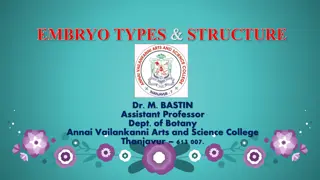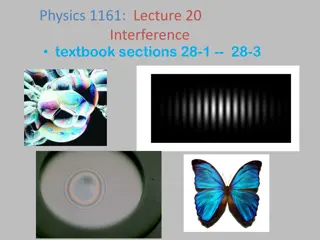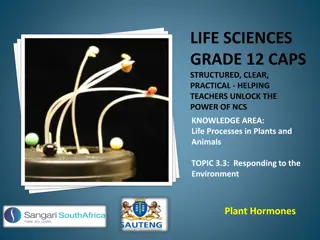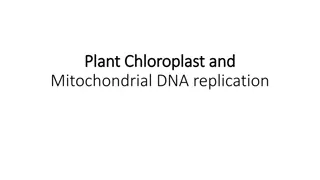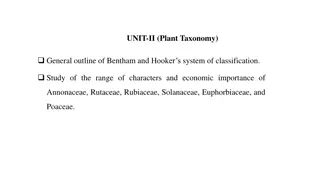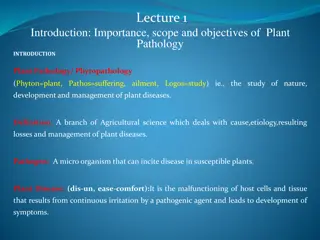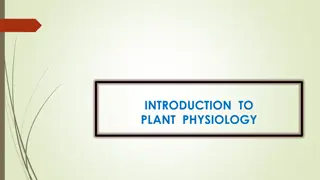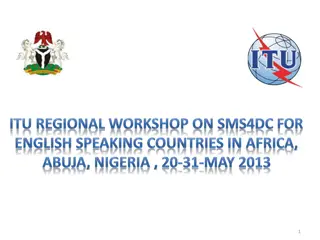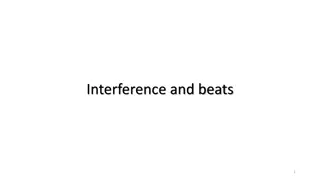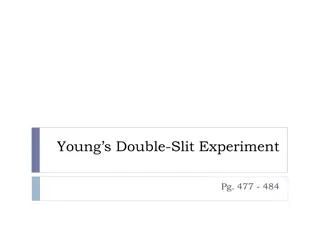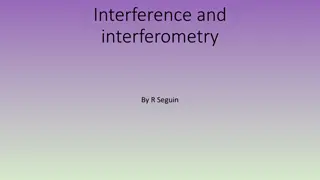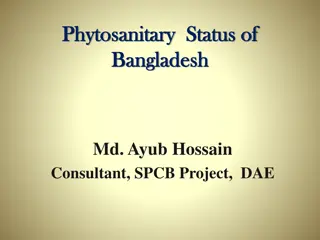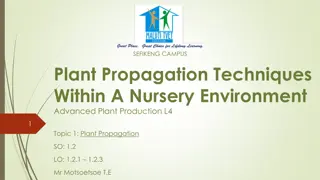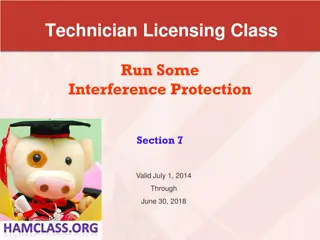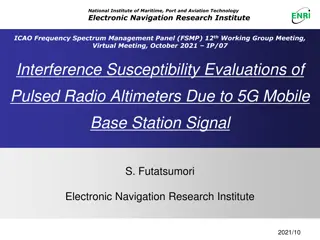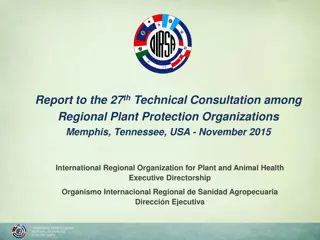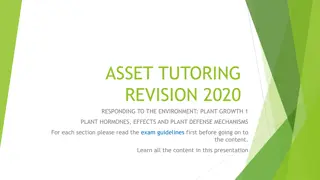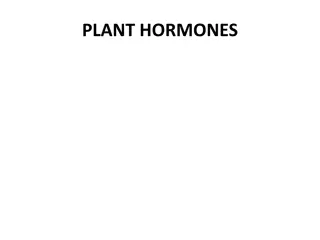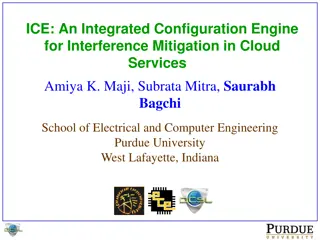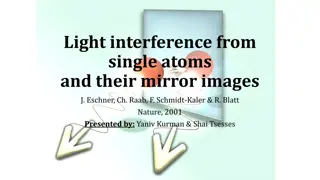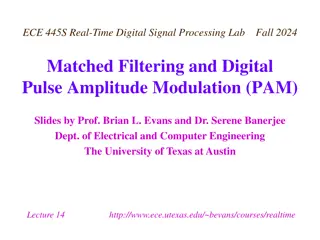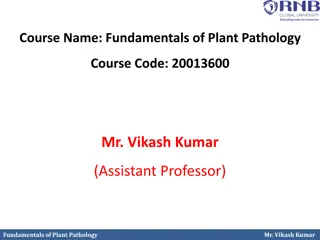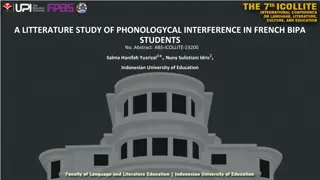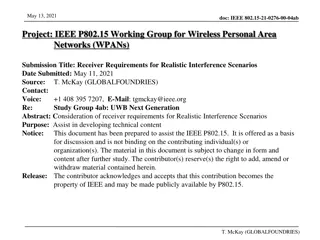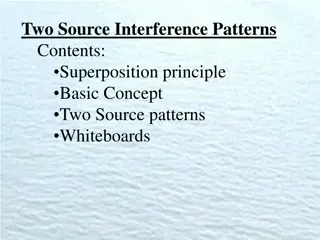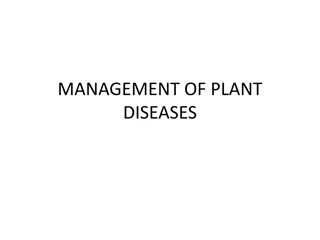Unit 1: Introduction and History of plant pathology
The science of plant pathology, which studies plant diseases and aims to protect the food supply by improving plant survival in unfavorable conditions. Explore the causes of plant diseases, their symptoms, and methods of prevention and control.
5 views • 13 slides
Amway Nutrilite All Plant Protein Powder 1kg Deutsche Post AG
Amway Nutrilite All Plant Protein Powder is a premium source of protein derived from plant-based ingredients. With each serving, you get a blend of high-quality protein to support your active lifestyle and dietary needs.\nAmway Nutrilite All Plant Protein Powder offers a convenient way to supplement
1 views • 4 slides
Enhancing In-Device Coexistence and P2P Communication in IEEE 802.11-23/2002r0
This document discusses proposals to improve reliability in the presence of interference or other device activities within the IEEE 802.11-23/2002r0 standard. Solutions include long-term indications for periodic service periods, interference indication in the frequency domain, expected behaviors, an
6 views • 25 slides
Understanding Forgetting: Theories and Influence on Memory Recall
Forgetting is a complex phenomenon influenced by theories such as Decay Theory, Interference Theory, and Motivated Forgetting. The Ebbinghaus forgetting curve highlights how memories fade over time. Decay Theory suggests memories decay over time, while Interference Theory explains how old and new me
0 views • 25 slides
Understanding Plant Embryogenesis: A Comprehensive Overview
Plant embryogenesis is a crucial process in the development of plant embryos from fertilized ovules, involving cell division, differentiation, and morphogenesis. This process leads to the formation of seeds, which play a vital role in the plant life cycle. The stages of embryo formation, structure,
0 views • 25 slides
Understanding Plant Tissue Culture: Methods and Requirements
Plant tissue culture involves the in-vitro culture of plant explants under aseptic conditions, covering cell, organ, and suspension cultures. This process, pioneered by German botanist Gottlieb Haberlandt, relies on the totipotency of plant cells. Key requirements include laboratory organization, su
0 views • 18 slides
Exploring Wave Interference in Physics: Superposition, Constructive, and Destructive Interference
Delve into the fascinating world of wave interference in physics, from understanding the concept of superposition to identifying constructive and destructive interference patterns. Discover how light waves interact through different paths and sources to create coherent or incoherent light. Explore t
1 views • 37 slides
Understanding Plant Hormones and Their Functions in Plants
Plant hormones play crucial roles in various plant processes such as growth, development, and response to environmental stimuli. Auxins, gibberellins, and abscisic acid are key plant hormones that regulate tropisms, cell division, elongation, flowering, seed germination, and dormancy. Understanding
1 views • 50 slides
Plant Mitochondrial and Chloroplast DNA Replication Mechanisms
Plant mitochondria and chloroplasts have intricate DNA replication processes. Mitochondrial DNA replication is independent of the plant cell cycle and is associated with specific proteins in nucleoid complexes. Plant mtDNA contains more genes than animal mtDNA, with a complex structure involving int
1 views • 16 slides
Overview of Bentham and Hooker's Classification System in Plant Taxonomy
Bentham and Hooker's system of classification in plant taxonomy, outlined in Genera Plantarum, provided detailed descriptions of families and genera based on original plant dissections. This classification system has practical value for plant identification, with keys for taxa and subdivisions for l
2 views • 47 slides
Understanding Plant Tissue Culture Media and Their Importance in In Vitro Growth
Plant tissue culture media play a crucial role in the in vitro growth and morphogenesis of plant tissues. The composition of culture media depends on the specific plant species and the type of material used for culture. Various types of media, such as White's medium, MS medium, B5 medium, N6 medium,
0 views • 6 slides
Understanding Plant Pathology: Importance, Scope, and Objectives
Plant pathology, also known as phytopathology, is the study of plant diseases and their management. It covers the causes, symptoms, and impact of pathogenic organisms on plants. The field aims to understand the interactions between plants and pathogens, develop control methods, and reduce losses in
0 views • 6 slides
Introduction to Plant Physiology: Exploring the Functioning of Plants
Plant physiology is a crucial subdiscipline of botany that delves into the processes and functions operating within plants. This field closely examines areas like plant morphology, ecology, cell biology, and genetics, shedding light on vital processes such as photosynthesis, respiration, and more. T
1 views • 7 slides
European Standards for Plant Biostimulants Development
The European Committee for Standardization (CEN) plays a crucial role in developing European standards for plant biostimulants, focusing on improving plant nutrition processes independently of nutrient content. The CEN/TC.455 committee is responsible for creating standards supporting the EU Fertilis
2 views • 5 slides
Understanding Interference in Radiocommunication Systems
Interference calculations and definitions in radiocommunication systems are crucial for maintaining signal quality. This content explains various types of interference, such as co-channel and adjacent channel interference, and important parameters like Protection Ratio. It also covers the effect of
1 views • 52 slides
Understanding Interference and Beats in Waves
Explore the fascinating phenomena of interference and beats in waves, where overlapping waves interact to create patterns of constructive and destructive interference. Witness how sound waves can also produce beats when interfering in time, resulting in a slow envelope effect. Delve into the princip
0 views • 40 slides
Understanding Young's Double-Slit Experiment and Interference Patterns
Thomas Young's double-slit experiment in the late 1700s provided evidence of light behaving as a wave, showcasing interference patterns. This experiment challenged the particle theory of light and supported the wave theory. The interference patterns observed helped scientists grasp the wave nature o
0 views • 27 slides
Understanding Young's Double Slit Experiment and Interference Phenomena
Explore the fascinating world of Young's Double Slit Experiment, where interference and diffraction patterns emerge as monochromatic light passes through two slits. Learn about constructive and destructive interference, how differences in path lengths affect interference patterns, and the concept of
0 views • 5 slides
Exploring Light Interference and Interferometry
Discover the fascinating world of light interference and interferometry through examples like Young's double slit experiment and supernumerary rainbows. Understand how the path length difference affects interference levels and delve into the applications of interferometry across various scientific f
0 views • 12 slides
Understanding Plant Tissue Culture: Techniques and Applications
Plant tissue culture involves maintaining and growing plant cells, tissues, or organs in artificial mediums under controlled conditions. It allows the regeneration of whole plants from small plant parts or cells. Hormones like auxins, cytokinins, and gibberellins are used in the process. Proper envi
3 views • 5 slides
Radio Frequency Spectrum Requirements for Civil Aviation Workshop Proceedings
This document discusses frequency assignment planning and interference models for VHF communication systems in civil aviation. It covers methodologies for establishing separation distances to prevent air-to-air interference and provides insights into interference models for co-frequency separation b
0 views • 13 slides
Plant Tissue Culture Methods for Growth and Reproduction Study
Plant tissue culture methods such as root tip culture, shoot-tip culture, leaf culture, flower culture, and anther and pollen culture allow for the study of growth, reproduction, and genetic variations in plants. These techniques involve culturing various plant parts under sterile conditions to inve
1 views • 20 slides
Understanding Plant Quarantine and Phytosanitary Measures
Plant quarantine involves efforts to prevent the entry, establishment, or spread of foreign pests through legal restrictions on plant and plant product movement. It is crucial for safeguarding plant health, food production, and ecosystems. Phytosanitary measures aim to ensure the health of plants by
0 views • 33 slides
Understanding Mineral Nutrition in Plants
Mineral nutrition in plants involves the acquisition of essential elements in the form of inorganic ions from soil, followed by their absorption and utilization in various plant processes. Around 60 different elements have been reported in plants, with 30 being essential for plant growth. These esse
0 views • 39 slides
Plant Propagation Techniques in Nursery Environment
Learn about plant propagation techniques within a nursery environment, including nursery operations, potting seedlings, plant protection, weed control, packing of nursery plants, and crafting tissues for plant growth. Explore the essential tasks involved in nurturing seedlings and trees before they
0 views • 17 slides
Understanding Interference Protection in Technician Licensing Classes
Learn how to address audio signal distortion, microphone gain settings, and interference issues in radio transmissions to ensure clear communication and compliance with licensing regulations. Discover practical solutions like adjusting transmitter frequency, managing battery power, and using noise b
0 views • 39 slides
Interference Susceptibility Evaluations of Pulsed Radio Altimeters Due to 5G Signal
This document presents the results of interference susceptibility testing of two pulsed radio altimeters in the presence of 5G mobile base station signals. The test parameters, setup, and results are detailed, including in-band and out-band interference evaluations. The objective is to assess the re
0 views • 16 slides
Plant Health Initiatives at the 27th Technical Consultation Among Regional Plant Protection Organizations - Memphis, Tennessee
The 27th Technical Consultation in Memphis, Tennessee focused on plant health initiatives by the International Regional Organization for Plant and Animal Health. OIRSA emphasized four key technical areas: plant health, animal health, agricultural quarantine, and food safety. Projects included addres
0 views • 13 slides
Plant Growth Hormones and Defense Mechanisms: Understanding Plant Responses to the Environment
Plant growth hormones and defense mechanisms play crucial roles in how plants respond to environmental stimuli such as water, sunlight, gravity, and more. From auxins promoting cell growth to gibberellins stimulating flowering, this presentation educates on the intricacies of plant hormones and thei
1 views • 13 slides
Understanding Plant Hormones and Their Role in Growth and Development
Plant hormones are vital compounds that regulate various processes in plant growth and development. They are mostly organic and can be gases. These hormones are produced in one part of the plant and transported to other parts where they induce physiological effects. The main phytohormones include Au
0 views • 125 slides
ICE: An Integrated Configuration Engine for Interference Mitigation
ICE is an innovative system designed to mitigate interference in cloud services caused by VMs sharing physical hardware resources. The system aims to improve user experience by addressing latency issues through interference-aware configurations and load balancer adjustments. By reducing server load
0 views • 25 slides
Exploring Light Interference from Single Atoms and Their Mirror Images
Delve into the intriguing realm of light interference with single atoms and their mirror images, as discussed in a Nature article from 2001. The study challenges the conventional understanding of spontaneous emission and coherence, presenting experimental setups, resonance fluorescence, and the Opti
0 views • 11 slides
Analysis on Impact of Blank Guard Interval to Inter-Symbol Interference
Performance gain was observed with Blank GI in coping with Inter-Symbol Interference (ISI). However, Intra-Symbol Interference still remains. Three Waveform Coding Designs were evaluated for their effectiveness. The study analyzed the effects of Blank GI on ISI and Intra-Symbol Interference to enhan
0 views • 14 slides
Real-Time Digital Signal Processing Lab: Matched Filtering and Digital Pulse Amplitude Modulation
Explore the concepts of transmitting one bit at a time, matched filtering, PAM systems, intersymbol interference, communication performance, and prevention of intersymbol interference in a two-level digital PAM system. The presentation covers topics like bit error probability, symbol error probabili
0 views • 32 slides
Exploring the Fundamentals of Plant Pathology: Understanding Viruses in Plant Diseases
Delve into the world of plant pathology with Mr. Vikash Kumar, as you learn about the nature, structure, and transmission of viruses affecting plants. Explore the important characteristics of plant viruses, their unique properties, and how they interact within plant cells. Gain insights into viral d
0 views • 14 slides
Phonological Interference in French BIPA Students: A Literature Study
BIPA students face challenges in pronunciation due to phonological interference, especially in French-speaking students. This study explores the linguistic aspects contributing to pronunciation errors and proposes phonetic corrections. Literature review discusses language interference and factors in
0 views • 11 slides
Receiver Requirements for Realistic Interference Scenarios in Wireless Personal Area Networks
This document discusses the receiver requirements for handling realistic interference scenarios in Wireless Personal Area Networks (WPANs). It covers topics such as second-order distortion, direct conversion receivers, blocker mitigation techniques, and proposals to specify sensitivity levels in the
0 views • 6 slides
Understanding Two-Source Interference Patterns
Dive into the fascinating world of two-source interference patterns with the superposition principle, constructive and destructive interference concepts, and demonstrations illustrating how overlapping waves interact. Explore scenarios like people talking simultaneously and ripples on a pond to gras
0 views • 31 slides
Overview of Plant Quarantine and Disease Management
Plant quarantine is a crucial practice that involves regulating the movement of plants and plant products to prevent the spread of pests and diseases. Originating with the first law in France in 1860, plant quarantine now encompasses various methods such as embargoes and inspections to safeguard pla
0 views • 11 slides
Sub Working Group Conclusions on Various Spectrum Interference Analyses
The draft report highlights conclusions from different sub working groups regarding spectrum interference analyses in various sectors like aeronautical telemetry, small unmanned aerial systems, air combat training systems, and precision guided munitions. It discusses feasibility challenges, separati
0 views • 7 slides




